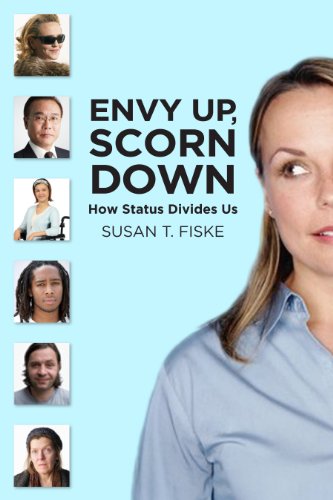Envy Up, Scorn Down: How Status Divides Us Book PDF, ePub eBook
Susan T. Fiske
Envy Up, Scorn Down: How Status Divides Us.pdf
File Name: Envy Up, Scorn Down: How Status Divides Us.pdf
Size: 30.22 MB
Uploaded: 2017-04-8 03:3:39
Status: AVAILABLE Last checked: 25 Minutes ago!
Rating: ★★★★★ 97 out of 100 based on 19584 userBook Descriptions:
An insightful examination of why we compare ourselves to those above and below us.
The United States was founded on the principle of equal opportunity for all, and this ethos continues to inform the nation’s collective identity. In reality, however, absolute equality is elusive. The gap between rich and poor has widened in recent decades, and the United States has the highest level of economic inequality of any developed country. Social class and other differences in status reverberate throughout American life, and prejudice based on another’s perceived status persists among individuals and groups. In Envy Up, Scorn Down, noted social psychologist Susan Fiske examines the psychological underpinnings of interpersonal and intergroup comparisons, exploring why we compare ourselves to those both above and below us and analyzing the social consequences of such comparisons in day-to-day life.
What motivates individuals, groups, and cultures to envy the status of some and scorn the status of others? Who experiences envy and scorn most? Envy Up, Scorn Down marshals a wealth of recent psychological studies as well as findings based on years of Fiske’s own research to address such questions. She shows that both envy and scorn have distinctive biological, emotional, cognitive, and behavioral characteristics. And though we are all “wired” for comparison, some individuals are more vulnerable to these motives than others. Dominant personalities, for example, express envy toward high-status groups such as the wealthy and well-educated, and insecurity can lead others to scorn those perceived to have lower status, such as women, minorities, or the disabled. Fiske shows that one’s race or ethnicity, gender, and education all correlate with perceived status. Regardless of whether one is accorded higher or lower status, however, all groups rank their members, and all societies rank the various groups within them. We rate each group as either friend or foe, able or unable, and accordingly assign them the traits of warmth or competence. The majority of groups in the United States are ranked either warm or competent but not both, with extreme exceptions: the homeless or the very poor are considered neither warm nor competent. Societies across the globe view older people as warm but incompetent. Conversely, the very rich are generally considered cold but highly competent. Envy Up, Scorn Down explores the nuances of status hierarchies and their consequences and shows that such prejudice in its most virulent form dehumanizes and can lead to devastating outcomes—from the scornful neglect of the homeless to the envious anger historically directed at Tutsis in Rwanda or Jews in Europe.
Individuals, groups, and even cultures will always make comparisons between and among themselves. Envy Up, Scorn Down is an accessible and insightful examination of drives we all share and the prejudice that can accompany comparison. The book deftly shows that understanding envy and scorn—and seeking to mitigate their effects—can prove invaluable to our lives, our relationships, and our society.
Envy Up, Scorn Down: How Status Divides Us by Susan T. Fiske
From reader reviews:James Jackson:
The book Envy Up, Scorn Down: How Status Divides Us can give more knowledge and information about everything you want. Exactly why must we leave the great thing like a book Envy Up, Scorn Down: How Status Divides Us? Several of you have a different opinion about reserve. But one aim that book can give many data for us. It is absolutely suitable. Right now, try to closer together with your book. Knowledge or info that you take for that, you can give for each other; you could share all of these. Book Envy Up, Scorn Down: How Status Divides Us has simple shape but you know: it has great and big function for you. You can search the enormous world by open up and read a book. So it is very wonderful.
Elizabeth Jamerson:
Information is provisions for anyone to get better life, information these days can get by anyone with everywhere. The information can be a information or any news even an issue. What people must be consider if those information which is inside the former life are challenging be find than now's taking seriously which one would work to believe or which one the actual resource are convinced. If you obtain the unstable resource then you obtain it as your main information you will have huge disadvantage for you. All of those possibilities will not happen with you if you take Envy Up, Scorn Down: How Status Divides Us as your daily resource information.
Mary Buss:
Playing with family in the park, coming to see the water world or hanging out with good friends is thing that usually you might have done when you have spare time, subsequently why you don't try matter that really opposite from that. One particular activity that make you not sensation tired but still relaxing, trilling like on roller coaster you have been ride on and with addition associated with. Even you love Envy Up, Scorn Down: How Status Divides Us, you are able to enjoy both. It is fine combination right, you still desire to miss it? What kind of hang-out type is it? Oh can occur its mind hangout fellas. What? Still don't have it, oh come on its known as reading friends.
David Clark:
Do you have something that you want such as book? The reserve lovers usually prefer to select book like comic, limited story and the biggest some may be novel. Now, why not trying Envy Up, Scorn Down: How Status Divides Us that give your enjoyment preference will be satisfied simply by reading this book. Reading addiction all over the world can be said as the way for people to know world a great deal better then how they react in the direction of the world. It can't be stated constantly that reading behavior only for the geeky man or woman but for all of you who wants to always be success person. So , for all you who want to start examining as your good habit, it is possible to pick Envy Up, Scorn Down: How Status Divides Us become your current starter.

How it works:
- 1. Register a free 1 month Trial Account.
- 2. Download as many books as you like (Personal use)
- 3. Cancel the membership at any time if not satisfied.

